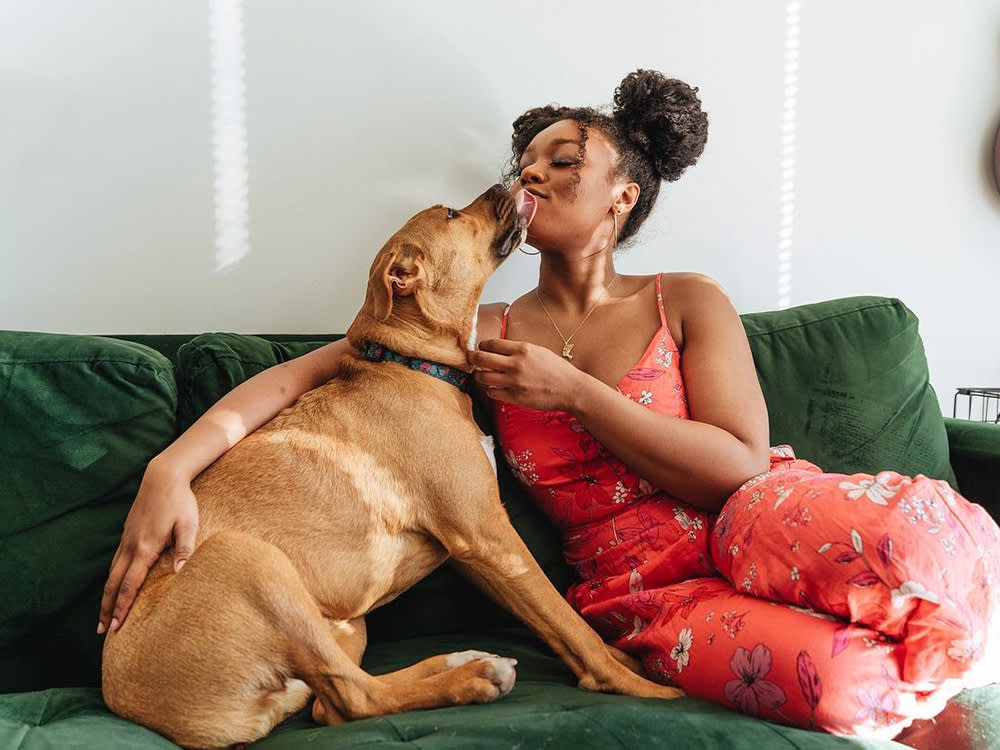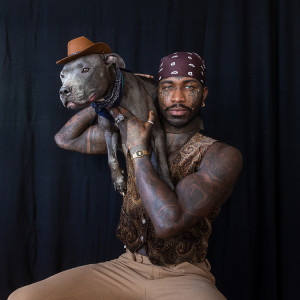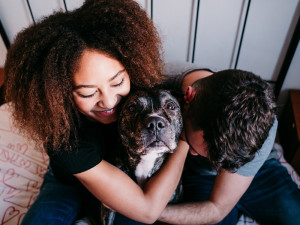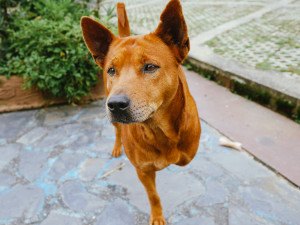Kassidi Jones and Her Pit Bull Ginger Are Shedding Light on Pet Parenthood and Racism
The academic — an exciting, emerging voice in animal advocacy — comes wielding both cute Pit Bull pics and uncomfortable truths.

Share Article
Did you know that several U.S. states once banned Black people from owning dogs? Or that dog-fighting was, in fact, popularized by white men? Or that animal-control policies disproportionately impact low-income communities?
If you didn’t, you should meet Kassidi Jones, the anti-racist animal advocate and PhD candidate behind Gingers Napsopens in new tab. Her Instagram feed is a mind-blowing mix of eye candy (specifically, of her perfectly adorable Black Mouth Cur / Pit Bull mix named Ginger), pet-ownership reality checks (like how much Ginger cost her in a yearopens in new tab), and smartly researched posts that confront many difficult truths around prejudice and pet ownership.
The Connecticut-based Jones is as exceptional an educator as she is a doting, loving dog mom. (She even has multiple directoriesopens in new tab, which lists links to POC-friendly pet services.) Kinship recently spoke with the warm, thoughtful academic-activist about the intersection between race, Pit Bulls, and unconscious (but also sometimes conscious) bias. Her replies left us with a lot to contemplate.
When did you decide you wanted a dog?
I’ve wanted a dog for my whole life! My grandparents actually have a pamphlet that I made [as a kid] in Microsoft Word, basically a presentation about why I should be allowed to have a dog — but they have to keep it while I’m at school. It didn’t work. Eventually, as an adult, I was living with someone who also wanted a dog. That was September of 2020.

That was a challenging time to adopt because everybody wanted a dog then. Add to that: The priority list for adoption skews white…
They’re asking people to have a certain income level, when we know that the income gap is really racially divided in the United States. They’re asking for references from other pet people or from vets, even when there are no vets in the neighborhoods where I grew up. They’re mostly in the suburbs and more affluent communities. They put out these markers that are indicators that the most likely to show up are a white, middle-class family. And then — boom — you have these racially divided statistics about who has pets and who doesn’t.
Was this in the back of your mind when you were going through the adoption process?
Absolutely not [laughs]. I study race and racism in the U.S. as part of my PhD program. But I hadn’t made the connection between racism and pet adoption or pet guardianship until after I got Ginger. I had this master spreadsheet of all of the local shelters in my area and their requirements, but it wasn’t even occurring to me that the really exclusive requirements were about keeping out people like me, in particular.
What was it like bringing home Ginger, considering you’d never had a dog before?
I have had fish, and I had a bearded dragon for eight years when I was in high school, but I never had a dog or a cat or anything like that. I was really excited to take her for a walk for some reason. I had really romanticized walking your dog. And she did not want to walk at all! So, it was just Ginger and I looking at each other really uncomfortably outside of my apartment building.
How has she changed her life?
My particular brand of depression is sleeping for up to 16 hours a day. So she’s been really influential in how I get my day started. She makes sure I move my body. And then there’s the fact that she got me involved with pet Instagram, which has really sent my life in a direction I never could have expected.
One of the saddest things you posted was how much Ginger loves people and wants to jump around and play with them, but you can’t let her do that, because you’re Black, and she’s a Pit Bull. There’s the fear that she might get accused of attacking someone.
Yeah, that’s a lot. She and I both have to be really on point. Because of what she looks like, she’s less likely to get a second chance. And because I’m a Black woman, I’m less likely to get a second chance. So we have to put our best foot forward all the time. Polite greetings are really important. I tend to hover closely. I have to watch the way she plays. I have to watch the way she interacts with new people, and sometimes that means just not letting people meet her. She really wants to make new friends for sure, but if she’s really excitable in that moment, I can’t let that happen.
How did you come to merge cute dog pics with pet activism on your Instagram?
Yeah, it wasn’t like that at launch. I started reading things, especially historical things about Black folks and dogs. And I just started sharing what I read. So in between these really cute pictures, you’d also get, like, my review of an academic article or something like that. People responded really well, because at the time, it seemed different from what some pet pages were offering.
What are some of the things that you learned about Black Americans and dogs going back into history?
It’s kind of the norm that, for generations, there’s been a pet in the house, but a lot of Black people can’t say the same thing. One of the reasons was that Black families could not have family dogs for a certain period of U.S. history. [There was a fear] that Black people would use dogs against white people, the way that white people had used dogs against Black people. It was very common to see newspaper advertisements about dogs that were specifically trained to hunt down and potentially injure or kill Black people that had escaped and run to freedom.
You had a great post up very recently about the history of Pit Bulls, how they were previously considered quite domestic.
They were considered a really American, really patriotic dog — a symbol of American fortitude. When you get to around the civil-rights movement of the 1960s, you’re seeing more and more economic discrepancies, more residential segregation. These low-income communities aren’t being served by police officers — just being attacked by police officers. So they had to take it upon themselves try to protect their families and their property. A lot of them got guard dogs that happened to be Pit Bulls. The pendulum is swinging now, because Pit Bulls are getting more and more associated with middle-class white women.
Because of rescues?
Well, yes, the white saviorism, which is another means to look down on Black and Brown families again. There is this important anecdote written by this woman who volunteered in a shelter. A Latino man had to surrender his dog because he couldn’t afford to feed himself, let alone the dog. And he’s in tears. He’s having a real breakdown. This is an emotional moment for him. After he leaves, the rescue puts up a story about how this dog has been discarded like trash and someone should come save him.
Have you ever thought about going into rescue yourself, for the reasons we just discussed?
I’ve absolutely thought about it! Right now, my priority is finishing this degree [laughs]. I’d love to engage with people face-to-face, one-on-one. On the Internet, it’s very easy to feel attacked.
But I’m guessing you also have some enriching conversations with people on the Internet?
People can say really kind things, too. They talk about trying to have these conversations or that they didn’t have the words for what they are experiencing. And I really appreciate that. I also think I focus a lot on African Americans. But this experience isn’t 100 percent unique to African Americans. A lot of different people are able to relate to discrimination in the pet industry. And from what they tell me, they like having a place to go without being attacked.

Nisha Gopalan
Nisha Gopalan has been a writer/editor for The New York Times, New York magazine, Entertainment Weekly, Variety, The Hollywood Reporter, and NYLON magazines. She currently resides in Los Angeles.
Related articles
![Yves, a man with a lot of tattoos and a brown paisley head bandana in tan pants holding his grey Pitbull dog who is wearing a tiny cowboy hat over his shoulder]()
The Misunderstood Pit Bull Is at the Top of Yves’s Advocacy List
The model, activist, and musician on his activism philosophy: “I’ve always been drawn to those who have been left behind, forgotten, misunderstood. I relate to them on a very deep, personal level. No matter how different you are, everyone deserves a chance.”
![Couple hugging their Pit Bull]()
What Is a Pit Bull, Exactly?
Everything you need to know about the five breeds dubbed “Pit Bulls.”
![tripod dog / dog with three legs]()
Why You Should Adopt a “Less Adoptable” Dog
Here’s why you shouldn’t rule out senior dogs, special-needs pups, bully breeds, or tripods.
![Black woman smiling and holding a Siamese cat which is looking into the camera]()
CARE Is Amplifying BIPOC Voices to Keep People and Pets Together
“We don’t consider what we are doing animal welfare work. We are taking a holistic approach to well-being for animals and humans.”



